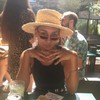Poulomi Basu has told the story behind her exhibition, Blood Speaks, many times. When she speaks with VICE for her upcoming display at the Photo 2022 photography festival, held in Melbourne this month, it's after years of reflection on a project that began in 2013.The crux of the exhibition revolves around an ancient tradition once practised in parts of Nepal and India: Chhaupadi. A cultural taboo that sees women exiled once a month to mud huts or livestock sheds as they menstruate.
Advertisement
It’s a centuries-old custom, born from Hindu tradition and superstition, often tied to the story of the execution of the guru Vishvarupa by the king of gods, Indra. Cursed, Indra sought to alleviate the sin by distributing it among four elements: the rivers, the trees, the land and, finally, women. The blood that came once a month during the menstrual cycle became the release of his error - deeming the woman untouchable and any contact by others impure.What began as a research project for Basu with the charity WaterAid has since transformed into a visual campaign of the violence and discrimination the tradition brings to South Asian women. It has brought visibility on a global level, but also sits closely to Basu’s own experiences as a young girl.“I was also a Hindu girl. When I was growing up I wasn't allowed to get into festivities or enter certain spaces during my period,” she told VICE, “So I was utterly aware of the milder versions of this form of violence and the normalisation of misogyny.”“But not to such an extreme form where women are treated worse than animals and where women get raped and murdered, and sometimes die as well.”Weaving between villages in rural Nepal and India, Basu documented the often stifling conditions that women faced during their period, offering glimpses into the complex patriarchal web many are caught in. Taking photos Basu often found herself in situations guarded by older members of the community - a symptom of intergenerational custom. Older women were also perpetrators of the tradition.
Advertisement
“It’s an extreme form of violence of menstrual exile, which has physical, emotional and psychological consequences,” Basu said, “For me, the project was really about exposing the battles of women and how their transition from being a girl to a woman is seen as something threatening because a woman’s sexuality is feared.”“Women often don't have much agency. You have to talk with them to make them understand that it's their decision. There are often all these gatekeepers around them, like the mother-in-laws, and the husbands and people you have to talk to in the first place to be able to get to the women.”“They take away all their power.”
Poulomi Basu's image shown at Photo22 in Melbourne
Though Chhaupadi was officially criminalised in 2018, Basu says that in more rural towns the tradition continues, citing the death of a girl named Parvati in 2019, who died with both of her babies in a mud hut in the winter. It’s a symptom of the widespread cultural oppression of women that, according to Basu, continues in the form of other traditions like the Rishi Panchami Festivalin Nepal.“Lots of things have changed but even in the cities, like in Kathmandu, especially with the Rishi Panchami Festival, it still endorses the fact that women have to purify themselves in the Bagmati River so that they're not reborn as prostitutes in the next life,” said Basu.
Advertisement
“It’s supposed to be a national holiday for women but it's so layered in misogyny. It's unbelievable. It's so deeply ingrained.”Basu remembers one woman in particular on her journey. Stepping forward at the age of 16 to declare that she’d no longer participate in chhaupadi, the young girl began receiving death threats from others in the community. Finally Basu immobilised her to be part of a community organisation which gave her agency to speak back. In situations like those Basu found a chain reaction.“I realised that when one woman came out more were coming out in the neighbourhood,” she said, “ they were all like we want to tell you, when we want to talk to you. When one person speaks up, more people want to speak up.”“I actually see them as survivors, not victims because they had their own agency to come forward and tell me what they were suffering.”For Basu, the agency of women can lead to the betterment of their lives in all areas of society.“A woman's agency is connected to a woman's right to education, that later impacts environmental justice, and other decisions made in the community,” said Basu. “If women lose out on school, and drop out of education, that means they can't be in spaces where decisions are being made and therefore they can’t become great leaders.”While Chhapaudi may still continue in various parts of India and Nepal, Basu points to the education of not only women but, importantly, adolescent men to turn the tides of misogynistic customs.
Advertisement
“I've always felt that that's a great age to start educating men so that they don't become perpetrators of violence,” said Basu.“Because when you're at the precipice of adolescence, even the boys feel sad that their mothers and their sisters have to be exiled.”At present, Basu’s Blood Speaks has now transformed from a photo essay into a VR experience. Her audience can dive into the stories of three women as each month they are exiled in order to keep the community “pure”.At the project's heart Basu aims to detangle the web of oppression and violence that women face and, in the process, give agency to those who for centuries haven’t had a voice of their own.
'Blood Speaks’ will be showing at PHOTO 2022 International Festival of Photography, running from the 29th of April to the 22nd of May 2022 in Melbourne and across Regional Victoria.
Follow Julie Fenwick on Twitter and Instagram.Read more from VICE Australia.
